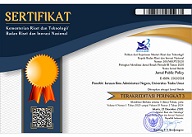Penerimaan Opini Audit Going Concern di Masa Pandemi COVID-19 pada BUMN Publik di Indonesia
Abstract
Keywords
Full Text:
PDFReferences
Angrijani, M. U., & Zakaria. (2017). Pengaruh Kinerja Keuangan Terhadap Opini Going Concern (Studi Pada Bank Umum Syariah yang Terdaftar di BEI). Jurnal Future, 256–266.
Anjani, D., Hermawan, S., & Biduri, S. (2020). Determinasi Audit Report Lag. Kompartemen: Jurnal Ilmiah Akuntansi, XVIII Maret (1), 76–97. http://dx.doi.org/10.30595/kompartemen.v18i1.4112
Aryantika, N., & Rasmini, N. (2015). Profitabilitas, Leverage, Prior Opinion dan Kompetensi Auditor pada Opini Audit Going Concern. E-Jurnal Akuntansi Udayana, 11(2), 414–425.
Averio, T. (2020). The Analysis of Influencing Factors on The Going Concern Audit Opinion – a Study in Manufacturing Firms in Indonesia. Asian Journal of Accounting Research, 6(2), 152–164. https://doi.org/10.1108/AJAR-09-2020-0078
DeAngelo, L. E. (1981). Auditor Size and Audit Quality. Journal of Accounting and Economics, 3(3), 183–199.
Fernandes, N. (2020). Economic Effects of Coronavirus Outbreak (COVID-19) on The World Economy. https://doi.org/https://dx.doi.org/10.2139/ssrn.3557504
Foster, B. P., & Shastri, T. (2016). Determinants of Going Concern Opinions and Audit Fees for Development Stage Enterprises. Advances in Accounting, Incorporating Advances in International Accounting, 1–17. https://doi.org/10.1016/j.adiac.2016.05.001
Gallizo, J. L., & Saladrigues, R. (2016). An Analysis of Determinants of Going Concern Audit Opinion: Evidence From Spain Stock Exchange. Intangible Capital, 12(1), 1–16. https://doi.org/10.3926/ic.683
Haribowo, I. (2013). Analisis Perbandingan Pengaruh Kualitas Audit, Likuiditas, Solvabilitas, Profitabilitas Terhadap Opini Audit Going Concern (Studi Perbankan Syariah di Asia). STAR-Study & Accounting Research, X(3), 51–67.
Institut Akuntan Publik Indonesia. (2013). Standar Profesional Akuntan Publik. Jakarta: IAPI.
Januarti, I., & Fitrianasari, E. (2008). Analisis Rasio Keuangan dan Rasio Non Keuangan yang Mempengaruhi Auditor dalam Memberikan Opini Audit Going Concern pada Auditee. Jurnal Maksi, 8(1), 43–58.
Jensen, M. C., & Meckling, W. H. (1976). Theory of The Firm: Managerial Behavior, Agency Costs and Ownership Structure. Journal of Financial Economics, 3, 305–360. https://doi.org/10.1016/0304-405X(76)90026-X
Junaidi, J., & Jogiyanto, H. (2010). Non-Financial Factors in The Going-Concern Opinion. Journal of Indonesian Economy and Business, 25(3), 369–378.
Manto, J. I., & Lesmana Wanda, D. (2018). Pengaruh Financial Distress, Pergantian Manajemen Dan Ukuran Kap Terhadap Auditor Switching. Media Riset Akuntansi, Auditing & Informasi, 18(2), 205–224. https://doi.org/10.25105/mraai.v18i2.3212
Purba, P. M. (2009). Asumsi Going Concern: Tinjauan Terhadap Dampak Krisis Keuangan atas Opini Audit dan Laporan Keuangan. Yogyakarta: Graha Ilmu.
Pemerintah Republik Indonesia. (2004). Undang-Undang Republik Indonesia Nomor 19 Tahun 2003 Tentang BUMN (p. 55). p. 55. Retrieved from http://eprints.uanl.mx/5481/1/1020149995.PDF
Ramadhani, K., Halim, A., & Wulandari, R. (2016). Variabel-Variabel yang Memengaruhi Penerimaan Opini Audit Going Concern Pada Perusahaan LQ 45 yang Terdaftar di BEI. Journal Riset Mahasiswa, 4(1), 1–14.
Rosner, R. L. (2003). Earnings Manipulation in Failing Firms. Contemporary Accounting Research, 20(2), 361–408. https://doi.org/10.1506/8EVN-9KRB-3AE4-EE81
Salean, A. P. (2013). Pengaruh Model Prediksi Kebangkrutan, Leverage, Audit Lag, dan Ukuran Perusahaan Terhadap Opini Audit Going Concern. Jurnal ULTIMA Accounting, 5(1), 55–76. https://doi.org/10.31937/akuntansi.v5i1.142
Septiana, I., & Diana, P. (2019). Pengaruh Auditor Switching, Likuiditas, Leverage, Disclosure dan Financial Distress Terhadap Kemungkinan Penerimaan Opini Audit Going Concern (Studi pada Perusahaan Pertambangan di BEI Tahun 2013-2016). Jurnal Bina Akuntansi, 6(1), 137–167. https://doi.org/10.52859/jba.v6i1.45
Simamora, R. A., & Hendarjatno, H. (2019). The Effects of Audit Client Tenure, Audit Lag, Opinion Shopping, Liquidity Ratio, and Leverage to The Going Concern Audit Opinion. Asian Journal of Accounting Research, 4(1), 145–156. https://doi.org/10.1108/ajar-05-2019-0038
Swanson, Z., & Theis, J. (2019). Study of Going-Concern Opinions. Journal of Accounting, Auditing and Finance, 34(3), 347–360. https://doi.org/10.1177/0148558X17706027
Syamsuri, R. (2016). Pengaruh Kondisi Keuangan Perusahaan, Kualitas Audit dan Opinion Shopping Terhadap Penerimaan Opini Going Concern. Jurnal Ilmiah Akuntansi Dan Bisnis, 11(2), 75–83. https://doi.org/10.24843/JIAB.2016.v11.i02.p02
Wibisono, E. A. (2013). Prediksi Kebangkrutan, Leverage, Audit Sebelumnya, Ukuran Perusahaan Terhadap Opini Going Concern Perusahaan Manufaktur BEI. Jurnal EMBA, 1(4), 362–373.
Yamali, F. R., & Putri, R. N. (2020). Dampak Covid-19 Terhadap Ekonomi Indonesia. Ekonomis: Journal of Economics and Business, 4(2), 384. https://doi.org/10.33087/ekonomis.v4i2.179
Zurachman, F.I. (2021). Analisis Faktor-Faktor yang Mempengaruhi Kecenderungan Penerimaan Opini Audit Going Concern. Jurnal IKRA-ITH Ekonomika, 4(58), 151–157.
https://www.kompas.com/sains/read/2020/05/11/130600623/diumumkan-awal-maret-ahli--virus-corona-masuk-indonesia-dari-januari.
https://covid19.go.id/berita/fokus-pen-2021-menanggulangi-pandemi-dan-membangkitkan-ekonomi-nasional.
https://www.cnnindonesia.com/ekonomi/20201216192218-92-583113/erick-thohir-dampak-covid-19-ke-bumn-sangat-berat.
https://covid19.go.id/p/single-tanya-jawab/apa-yang-dimaksud-dengan-pandemi.
DOI: https://doi.org/10.35308/akbis.v7i2.8228
Refbacks
- There are currently no refbacks.





